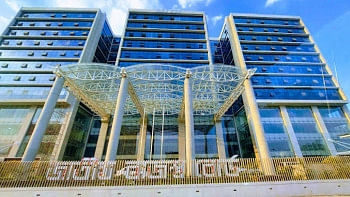The Generations of Nostalgia at Dhaka University

To us, the current generation of DU students, the experience of the university is marked by many little things. Whether it be tea stalls run by our beloved "mamas" at TSC, the overly sweet lemonade at Shadow, the music and the festivals, the long walks through Suhrawardy Udyan and Fuller Road and countless other experiences that add to the memories of our campus life every day.
Apart from all that, the years we spend in the university are in many ways the formative years of our lives. The friends we make, the stories we live together and the culture that encircles our lives play a huge role in shaping us as individuals. Many of us had a particular fascination with this university due to the history associated with it, but that was not it. It was also the stories our parents told us from their university days that helped forge this fascination even stronger.
What was it like for our parents, who went to Dhaka University decades ago?
I spoke to my friend Tasfia Tasneem, recent alumnus and currently a Master's enrollee in the Department of English. Tasfia's mother, Sultana Akhtar, attended Dhaka University in the early 80s and graduated from the Department of Sociology. According to her, the overall environment was much safer back in her day, with her peers being very cooperative and open-minded.
Tasfia's opinions about her university life are different, however. "I think my mother's experience is significantly different from mine," she says. "Back then, students from different cities, and of different ideologies and morals, lived under the same roof. We still have that but anyone having a different viewpoint from the majority gets singled out or coloured. We don't have that harmonious coexistence among different groups of students anymore. The environment, to say the least, has become toxic in my opinion."
Sultana Akhtar was a resident student, and a large portion of her campus life was marked by cultural activities, as her friends and classmates were culturally active. Although Tasfia never had the experience of being a resident student, she thinks the culture at DU is something that has positively influenced her life as well.
Dhaka University has been a hub for promoting and nurturing different forms of art since the beginning. This environment alone has created many talented writers, singer-songwriters and artists in the past and continue to do so in the present. The trends have well adapted to the changes in taste among the students brought by the time. The presence of pop culture is evident almost everywhere, from John Lennon and Sanjeeb Choudhury to Pink Floyd and Che Guevara graffiti scattered all over the campus. The movie screenings and concerts add more to this experience.
"As an individual interested in arts and culture, Dhaka University was a great fit for me because it has a lot to offer in this regard," Tasfia expresses.
Back in our parents' days, political activism in the university campus was far more prominent. The legacy is powerful, with the history of the birth of the country being associated with this university, which years later was followed by a major democratic movement in the 1990. Politics was a major part of the campus, and the communication between politically-involved students and regular hall residents was much better, according to Sultana Akhtar.
Tasfia, however, draws a stark difference in her experiences from her mother's in this regard.
"Now, most students seem unaware of what's happening in the real world. However, the movements in 2018 followed by the 2019 DUCSU election after 28 long years were crucial in initiating a change, and I believe that the situation with the political awareness among students is getting better with time," she says.
Slowly but surely, the times they are a-changin', and hopefully for the better.
The experiences with the aesthetics of campus life seem to change every year, though, in the name of "development", among other things. Just the year before our batch got into the university, the streets in the university area would be lit up by warm and yellow hues of the sodium lights in the evening. The name "Sodium Batir Gaan" was inspired by this evening view of the campus. Sodium Batir Gaan became a musical event very close to our hearts over the last couple of years and is still going strong, while the sodium lights were replaced some four or five years ago. Nostalgia remains, if not the sight. And this is how it's going to be for the future batches as well. Case in point: while we initially had a campus life that wasn't marked with the changes brought by the construction of the metro rail, it will never be the same again for the future generations of the students.
Despite many things that we wish to change about this institution, it is still the place for us where we got to live the best years of our lives.
"I had a good time on the campus. In a way, I feel very lucky to be part of a department that always promoted free-thinking. I encountered teachers that I absolutely loved as well," shares Tasfia.
The University of Dhaka has witnessed many things; things as great as the birth of a nation, and as small and personal as the making of beautiful friendships, memories, ideas and cultures. These are the stories that live on, and get passed onto the next generations. So, no matter how different the experiences are, the rose-tinted glasses of nostalgia resonate with all the generations the same way, from our grandparents to parents and now to us, bringing back the homesick blues.
Nahaly Nafisa Khan is a sub-editor at Toggle, The Daily Star.

 For all latest news, follow The Daily Star's Google News channel.
For all latest news, follow The Daily Star's Google News channel. 



Comments